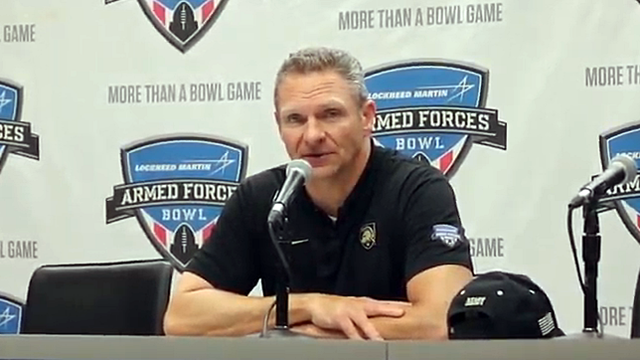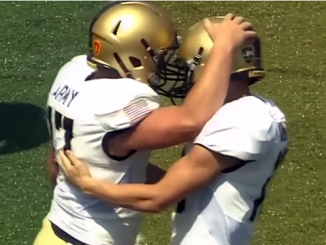
It was the evening of the 2015 Army-Navy Game.
The discussion points for that contest revolved around Navy quarterback Keenan Reynolds and Navy’s 13-game winning streak over Army, which enabled the Midshipmen to control the Commander-In-Chief’s Trophy race most years in that period.
Reynolds’ exclusion from the Heisman Trophy ceremony as a finalist was a major news item that week. Navy’s ability to win its tenth game of the season and push its winning streak over the Black Knights to 14 games gave Ken Niumatalolo still more high-end achievements to tout, nearly a decade into his coaching career in Annapolis. Niumatalolo built such a name for himself that BYU gave him a hard look when its head coaching position recently came open.
Navy was the focus — and the central success story — of the service academy football world.
Jeff Monken won a total of six games in his first two seasons at Army. Those weren’t failures, because Monken needed and deserved time to turn around the Black Knights. However, it was not easy to look at what Monken was doing at the end of 2015 and confidently proclaim that a new golden age of Army football was about to begin.
Did Army seem to be in the process of getting better? Yes. Was there more hope entering the 2016 season than previous years this decade? Absolutely. Yet, it is one thing to make moderate and noticeable improvements. It is quite another matter to totally transform an identity and reputation, and to completely change the dynamics of power in service academy football.
In the three years since the 2015 Army-Navy Game, Monken has not merely made Army a lot better. He has enabled the Black Knights to decisively displace Navy as the kings of service academy football. Monken and his program have become everything Navy was in three short years… and in some ways, West Point has exceeded Annapolis, as shown by the 70-14 rout of Houston in the Armed Forces Bowl just before Christmas Day.
The Houston team Army crushed in Fort Worth was not a particularly strong team, but the 2018 Cougars were not very different from the 2015 Pittsburgh team Navy defeated by a more modest 44-28 score in the 2015 Military Bowl.
Army has promptly checked the boxes Navy did in 2015. The Black Knights have now become the team in the Army-Navy Game which has established the firm upper hand while their opponent makes the crucial late-game mistake, a complete 180 from the 14-year winning streak for the Midshipmen.
Army has taken ownership of the Commander-In-Chief’s Trophy.
Army has mastered its execution of the triple-option offense. Kevin Hopkins, Jr., didn’t get the Heisman buzz Reynolds received for Navy three years ago, but he did hit the “rush for 1,000 yards and pass for 1,000 yards” landmark which quality triple-option quarterbacks manage to reach.
Consecutive bowl appearances. Consecutive bowl wins. An 11-win season for the first time in program history.
All these things Navy proudly and rightly trumpeted at the end of its 2015 are the achievements Army has attained three years later. The dominance Niumatalolo had established now belongs fully and firmly to Monken.
Niumatalolo’s presence in the coaching carousel relative to BYU, the one place he seriously considered as an alternative to Navy, has been replaced by college football pundits wondering why Kansas didn’t select Monken to replace David Beaty, instead opting for Les Miles.
Meanwhile, as Army rises to the spot Navy once occupied, it’s not as though Navy has merely moved one or two seats to the side of Army’s service academy throne. Navy has tumbled down to a 3-9 record, basically where Army resided before everything came together in 2016. Monken hasn’t merely elevated his own program; he has — to a degree — rattled the program Army looked up to (in the standings and in terms of singing second) for nearly a decade and a half. Moreover, Monken has won 10 and 11 games in consecutive seasons, something Niumatalolo didn’t do. If you were to say that Army has done what Navy did even BETTER than Navy, you could make the case. Yes, Navy had sustained its success for over a full decade, so in terms of raw longevity this century, Navy still eclipses Army to a significant extent. Yet, in terms of a three-year run, Monken’s run compares favorably to anything by Ken and his Navy men.
Army will now face one of the central challenges of maintaining success on a longer-term basis — namely, coordinators leaving for bigger jobs, as in the case of defensive coordinator and Broyles Award finalist Jay Bateman leaving for North Carolina under Mack Brown. Yet, there was reason to think this just-completed 2018 season might not hit all the high notes it did with Ahmad Bradshaw departing and Hopkins taking over. Yet, that was hardly an impediment. Monken put the pieces together. He has found the secret sauce. He is in position to replicate success and figures to do it as long as he remains in West Point.
The 2018 Army season and the curb-stomping of Houston in the Armed Forces Bowl were important in isolation, but they were and are powerful in a larger context spanning the past three years.
What Navy once was, Army now is — and arguably, even better.
Not bad, Jeff Monken. Not bad at all.


